 Petzlover
Petzlover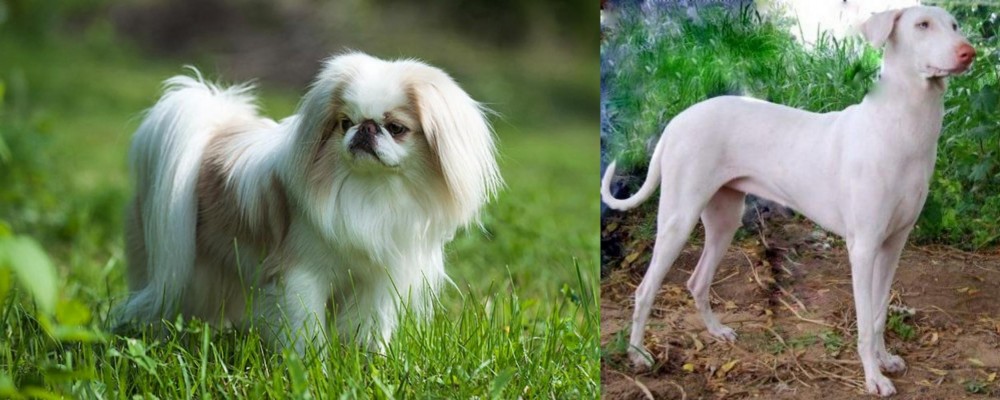 Japanese Chin is originated from Japan but Rajapalayam is originated from India. Japanese Chin may grow 48 cm / 18 inches shorter than Rajapalayam. Japanese Chin may weigh 19 kg / 41 pounds lesser than Rajapalayam. Both Japanese Chin and Rajapalayam has almost same life span. Japanese Chin may have less litter size than Rajapalayam. Japanese Chin requires Moderate Maintenance. But Rajapalayam requires Low Maintenance
Japanese Chin is originated from Japan but Rajapalayam is originated from India. Japanese Chin may grow 48 cm / 18 inches shorter than Rajapalayam. Japanese Chin may weigh 19 kg / 41 pounds lesser than Rajapalayam. Both Japanese Chin and Rajapalayam has almost same life span. Japanese Chin may have less litter size than Rajapalayam. Japanese Chin requires Moderate Maintenance. But Rajapalayam requires Low Maintenance
 The Japanese Chin, also known as the Japanese Spaniel, has always been known for thousands of years as a dog with strong companion characteristics.
The Japanese Chin, also known as the Japanese Spaniel, has always been known for thousands of years as a dog with strong companion characteristics.
Hailing from Asia, he is also known as the Japanese Spaniel. In Japan, the Chin dogs are royalty and lapdogs, and while the exact origin of the Japanese Chin isn't quite clear, it is an ancient toy breed.
The first Japanese Chin was brought to America in 1882. The toy breed was recognized by the American Kennel Club in 1888, as a Japanese Spaniel. The AKC changed the breed name to the Japanese Chin in 1977.
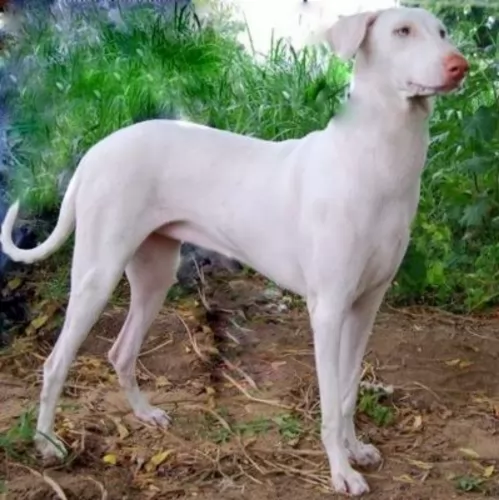 The Rajapalayam dog hails from India, from the small town of Rajapalayam in Tamil Nadu.
The Rajapalayam dog hails from India, from the small town of Rajapalayam in Tamil Nadu.
Known also as the Poligar Hound, this Indian Sighthound has been the companion of royalty in Southern India.
Though the breed dates back a few hundred years, the developers of the breed brought about an albino dog. This Indian breed dog is almost on the verge of extinction. This is a pity as he is a splendid dog. Breeding centers have been set up to prevent the dog disappearing altogether.
 As a small sized dog, the oriental looking Japanese Chin stands at about 20 to 27cm in height and weighs roughly 2 to 6kg. He has a large round head with big brown eyes and a short muzzle. The ears are long and feathery and the tail is long and held up over the back.
As a small sized dog, the oriental looking Japanese Chin stands at about 20 to 27cm in height and weighs roughly 2 to 6kg. He has a large round head with big brown eyes and a short muzzle. The ears are long and feathery and the tail is long and held up over the back.
The long silky single coat is either white and red or white and black or it can be tri-colored too – white, black and reddish-tan.
The Japanese Chin is a small, evenly tempered dog and the toy-size dog, according to people who have owned him as a pet, say he has some cat-like features – the ability to leap and the ability to wash himself similar to what a cat does.
He is also a typical lap dog liking nothing more than to lie in your lap and be petted. He just loves being with his human family and his smallness allows him to fit well into city- or country life.
He is an intelligent dog. He is small but strong-willed and that is why both you and him will benefit from having him trained and socialized as he becomes more amicable and obedient.
Social, jaunty and content, he is everyone’s friend and will be a suitable playmate for children, being loving and devoted to his entire family. They make great therapy dogs as he has the knack of being sensitive to the feelings of people and adjusts his mannerisms to suit the people he is with.
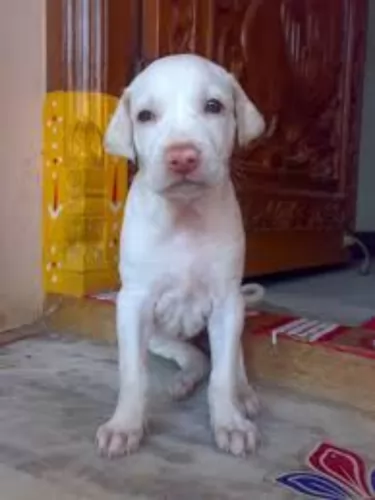 This is a large dog, graceful and elegant standing at between 65–75cm and weighing 22 to 25kg.
This is a large dog, graceful and elegant standing at between 65–75cm and weighing 22 to 25kg.
This is a hound dog, lean and muscular and will rely on good exercise to keep him in tip top working condition.
He is somewhat heavier than other sighthounds with a deep chest and long straight legs. He is a low maintenance dog with the white coat being short and fine. The ears are floppy ad the tail is slim and long and sometimes held up and curved.
The Rajapalayam has always been used for hunting wild boar, and today he makes a good guard- and watchdog. He needs a lot of space and exercise and isn’t suited to living in small spaces in the city.
He is a loving dog and becomes loyal and devoted towards his owner, being essentially a one-person dog. They tend to be aggressive and aloof with strangers.
Training and socialization will be important for this intelligent dog if you want him to behave around people. He doesn’t particularly get on well with other pets in the home, but training and socialization can change this.
 The Japanese Chin is just longing to be your special friend. When you treat him with the love and care he deserves, you'll discover that he is a sweet, gentle companion who will be loyal and loving to his human family.
The Japanese Chin is just longing to be your special friend. When you treat him with the love and care he deserves, you'll discover that he is a sweet, gentle companion who will be loyal and loving to his human family.
He is a quiet pet and intelligent enough to be trained and socialized so that he is obedient and ready to please. Although he doesn't bark much, he makes quite a few other noises such as wheezing, snorting and snorting. He makes up for it by being entertaining and loving towards you so that you life is brighter just by having him in it.
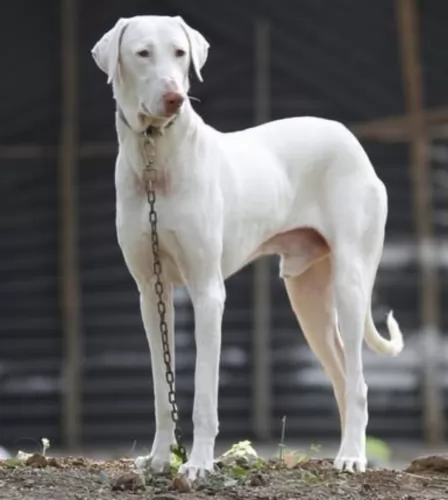 A Rajapalayam dog has always been a hunter and this makes him an excellent watchdog, always on the look out for intruders.
A Rajapalayam dog has always been a hunter and this makes him an excellent watchdog, always on the look out for intruders.
The Rajapalyam has always been a dog deeply attached and loyal to his owners.They are good family companions and pets and with so many good characteristics, one hopes that this dog will still be around for a long time.
 There are a few health issues with your Japanese Chin that are worth knowing about such as hypoglycemia, cataracts and heart murmurs. Allergies and dental issues also need to be checked.
There are a few health issues with your Japanese Chin that are worth knowing about such as hypoglycemia, cataracts and heart murmurs. Allergies and dental issues also need to be checked.
Dog breeds with the flattened face always battle with dental-, eye and breathing problems. With good care however, your Japanese Chin can reach anything from 10 – 12 years of age.
Murmurs come about because of a disturbance in the blood flow and which can produce an audible noise. If your dog's murmur is associated with structural heart disease, your dog may display signs of congestive heart failure and he'll be weak for instance and be coughing.
When your dog gets to the vet, the course of treatment will be determined on the type of heart murmur. Luckily puppies with low grade murmurs often grow out of it but if you have an adult dog, routine diagnostic imaging may be recommended by your vet.
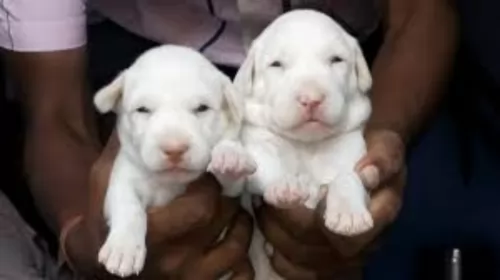 The Rajapalayam isn’t a fragile dog, and he can live to 10, 11 or 12 years of age. There are always a few things to look out for with him. With white dogs, there is always a high incidence of deafness. Puppies born with blue eyes are often deaf.
The Rajapalayam isn’t a fragile dog, and he can live to 10, 11 or 12 years of age. There are always a few things to look out for with him. With white dogs, there is always a high incidence of deafness. Puppies born with blue eyes are often deaf.
White coated dogs, because of the piebald gene, are often affected by deafness. The piebald gene is because of an absence of melanocytes. These are cells which create pigment. When a dog is born without the genes to create melanocyte cells, a white hair coat and sometimes blue eyes are the result.
There are also skin problems associated with these all white dog breeds such as mange and dermatitis. Check him over for ticks and fleas.
 The Japanese Chin has a single coat, and a brush once or twice a week will keep the coat silky and untangled.
The Japanese Chin has a single coat, and a brush once or twice a week will keep the coat silky and untangled.
Check his ears for dirt and wax and try to wipe inside the ears, being very, very careful not to go deep into the ear to avoid damage.
Clip his nails and brush his teeth as small dogs are more prone to dental disease. Periodontal disease is preventable with dental cleaning. Dental disease starts when plaque sticks to the surface of the teeth. It hardens, spreads under the gum line and cause tissue damage. It also damages the immune system.
The Japanese Chin is an energetic dog and loves a game and a walk. It isn't the kind of dog that you will take on your hikes or swimming as it tends to huff and puff after a while from too much exercise, and more specifically in hot weather.
Dog experts say that a grain-free food is best for this kind of dog. Kibble which comes with lean protein and with plenty of vitamins and minerals such as taurine and carnitine is recommended. They are good for the joints, coat, heart and eyes. Japanese Chins can be prone to heart- and eye problems and kibble rich in omega 3 fatty acids will be good for the Chin for many excellent reasons.
If you're in any way uncertain about what to feed your Japanese Chin, speak to your vet as the type of food you feed your pet will determine how healthy he will be. Always ensure he has access to fresh, cool water.
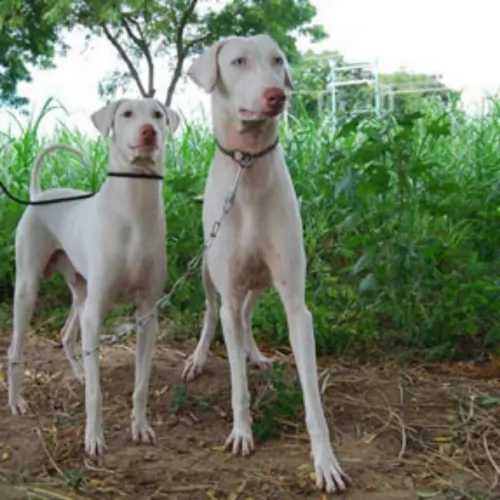 The short coat does shed so he will need to be brushed once or twice a week.
The short coat does shed so he will need to be brushed once or twice a week.
You will also need to follow a regular grooming program with this dog, checking inside his ears for infection, checking his eyes for discharge and checking inside his mouth for bad, rotting teeth. Teeth- and gum disease aren’t just about losing a tooth - bad teeth and gums can cause a host of health issues for other body parts like the heart and kidneys.
His toe nails too wll require clipping to prevent splitting and chipping.
Provide your pet with lots of exercise – a walk every day, a run in the park off his leash as well as ball and frisbee games.
You can’t ever become lax with giving your pet good food. Good, wholesome food promotes health and longevity.
There are some good commercially manufactured dog foods which are wonderfully convenient – you just want to be sure its the high quality ones full of vitamins and minerals.
Also, provide him with uncomplicated, home-made dog food too. Boiled chicken, brown rice or pasta, sweet potatoes, carrots and spinach, all chopped up and mixed in twice a week with the dry kibble will ensue health and contentment.
Try and add some raw meat in as well. This simple diet plan will be gentle on your pet’s digestive system.
Make sure he always has a bowl of fresh, cool water available to him.